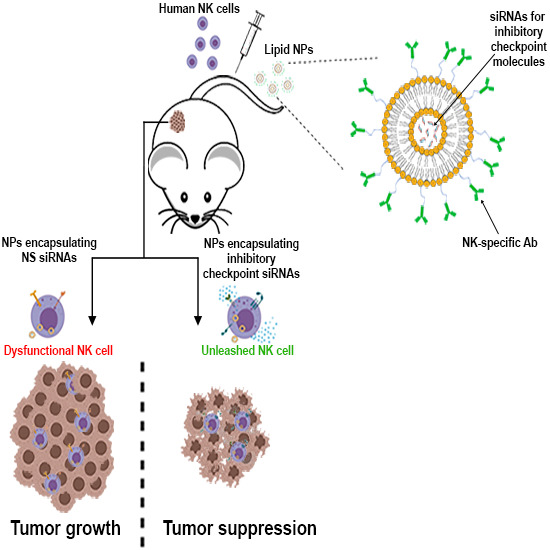
Bar-Ilan University researchers develop new nanotechnology to fight cancer cells
Newfound technology enables the use of nanoparticles to assist the body’s own immune system to fight cancer.
The technology, developed by a research team at Bar-Ilan University, uses nanoparticles to eliminate obstacles in the malignant tumor’s environment that impede the normal activity of natural killer cells (a special sub-type of white blood cells called lymphocytes).
Natural killer cells (NK cells) are a potent defense weapon of the body that assists the immune system in its fight against viral infections, tumor growth and the spread of cancerous metastases. Cancer researchers have known that natural killer cells have important potential to treat cancer by immunotherapy since they have the ability, under certain circumstances, to readily and efficiently kill cancer cells and attack them directly.
Natural killer cells can produce a potent immune response in the vicinity of the tumor, known as the tumor microenvironment. Still, despite their great promise, several obstacles make it difficult for researchers and physicians to utilize killer cells for immunotherapy, including the need to manipulate them by means of molecular/genetic engineering outside the body in order to enhance their therapeutic efficacy against cancer.

Moreover, no clinical study performed to date has demonstrated the superiority of NK-cell-based treatments in patients with advanced cancer. The reason is due to the fact that the tumor microenvironment (TME) usually activates inhibitory mechanisms that suppress the activity of NK cells.
To overcome these obstacles, Professor Mira Barda-Saad and her research associates at Bar-Ilan’s Mina and Everard Goodman Faculty of Life Sciences developed a mechanism to incorporate lipid-based nanoparticles into the NK cells. The procedure “packs” RNA molecules in a lipid envelope, and once penetrated, they interfere with the expression of the gene responsible for inactivating the NK cells.
The nanoparticles target the killer cells inside the patient’s body, are incorporated into them and by means of a biochemical reaction enable them to fulfill their task—namely, reducing the tumor mass. The significance of this innovation is that this novel nanotechnology mechanism can prove to be very efficient in applying already established medical approaches based on NK cells, as well as other treatments.
Lipid particle nanotechnology used as an RNA vehicle is a field-proven technology, as was demonstrated in the COVID-19 vaccine, but in contrast to the immune system, Barda-Saad uses it in her laboratory to temporarily “silence” gene expression aimed at enhancing the immune response in pathological conditions.
“Our research proved the feasibility of using nanoparticles to enhance immune-system activity, in this case of NK cells, against human hematological malignancies. Going forward, particles will be created that can be administered orally to patients,” says Barda-Saad. “This strategy must still be submitted for pre-clinical and clinical safety testing, as is customary for any drug. Its use can be extended beyond cancer only; viral infections and other pathological conditions can also be addressed by NK cells as well as by other cell types in the immune system, such as T or B lymphocytes, and for other pathologies.”
The idea to develop nanoparticles is derived from the fact that they eliminate the need to purify and isolate patients’ cells outside the body as in the strategies currently used for treating blood cancers, such as chimeric antigen receptor (CAR)-NK or CAR-T. The nanoparticles are administered to the patient, and they can independently identify the specific target cell while in the body, penetrate it and alter its behavior according to their contents.

In this research, the nanoparticles specifically identify the NK cells, thanks to the antibody attached to their surface. The NK cells target the nanoparticles, engulf them and the material enclosed therein is released inside the cell, enabling the natural killer cells to perform their task.
Barda-Saad adds that immunotherapy, especially that which is based on NK cells, is gaining increasing importance in medicine. “At present, the scientific world is focusing on treatment strategies involving NK cells, because it has been proven that in some aspects, they are superior to T cells, another variety of immune system cells,” she explains. “Therefore, therapeutic strategies with NKs are evolving. The nanoparticles we developed can further empower these strategies.”
Barda-Saad has no doubt that this technology is a sign of the future.
“The use of nanoparticles in this innovative and groundbreaking domain of next-generation immunotherapeutic drugs enhances the immune response against pathogens that cause illness,” she says. “We saw that this technology was successful in Pfizer’s and Moderna’s COVID vaccines, and I firmly believe that by combining it with the right molecules detected in our laboratory we will be able to harness it in the fight against cancer.”
Israel in the News